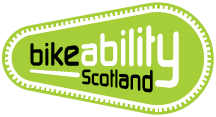
Why is Bikeability Scotland the recommended cycle training for pupils?
Bikeability Scotland is underpinned by the National Standard for cycle training, a statement of competent cycling and cycling instruction. It sets out the skills and understanding needed to cycle safely and responsibly and to enable others to cycle. The standard provides the basis for Bikeability and a range of adult cycle training programmes.
It’s built upon similar principles to training for motorcycle riders and car drivers and was developed by over 20 expert organisations. The National Standard for cycle training is maintained by the Department for Transport.
How much does Bikeability Scotland training cost?
Bikeability Scotland is completely free to schools and their pupils. Cycling Scotland supports local authorities with practical advice, funding, and instructor training to start Bikeability Scotland in their schools.
Is Bikeability Scotland training available to independent schools?
Yes, absolutely. If you'd like to teach Bikeability Scotland at an independent school (either as a member of staff or a volunteer), please contact Cycling Scotland directly.
Who can deliver Bikeability Scotland training to pupils?
It's usually delivered by a member of staff at the school or a volunteer. Volunteers are often parents, carers, grandparents, guardians or members of the local community. Cycling Scotland provides training courses for Bikeability Scotland Instructors.
Your local authority coordinator can advise you of the training options in your area.
Which year groups receive Bikeability Scotland training?
There are no set years in which each level of Bikeability Scotland should happen but, as a guide, these are the year groups in which the training often takes place:
- Level 1 - P5
- Level 2 - P6
- Level 3 – Between P7 and S2
Do all pupils have to be able to ride a bike before starting Level 1 training?
Yes, they do. If there are pupils who can’t ride a bike, talk to your local authority coordinator about arranging additional training for absolute beginners. Alternatively, Play on Pedals supported by Cycling Scotland has created videos to help parents teach and support their children in learning to ride.
What if pupils have additional support needs, can they still do Bikeability Scotland training?
Yes, they can take part. Cycling Scotland is committed to making Bikeability Scotland training as inclusive as possible. Training sessions might require extra volunteer support, the use of specialist bikes or slight modifications to the training programme. All trainees with additional support needs should be assessed on an individual basis by the instructor prior to attending training.
If you have any concerns, assess the needs of the individual by speaking to them directly, their parent or guardian and find out what support is available via your local authority coordinator.
Do pupils have to do all three levels of Bikeability Scotland training?
No, but we’d recommend children complete levels 1 and 2 if possible. The three levels have been designed around taking children on a natural pathway from the basics to more complex journeys by bike. For children to get the most from this pathway, it is recommended that they take part in all three levels if there is the opportunity to do so. We realise that it’s not always possible to deliver the full pathway and would encourage all schools to start with Level 1 and take it from there.
Where does Bikeability Scotland training take place?
Level 1 takes place in the playground, or another suitable off-road location, while pupils learn bike handling skills. Levels 2 and 3 take place on roads.
What sort of bikes can pupils use for the training?
The most important thing is to ensure that the pupils' bikes are safe and the right size for them. For Bikeability Scotland levels 2 and 3 the bike must be in a road-worthy condition with an independent front and rear brake. Having gears on a bike is a good thing to have, but not essential.
We also recommend that bikes are fitted with a front white reflector, and that lights are used for training taking place in poor weather conditions.
BMX bikes are not ideal for Bikeability Scotland training due to their lack of gears and low saddle position but providing these are fitted with both front and rear brakes, and are in good working order, they can be used.
What if pupils don't have access to a bike they can bring in for the training?
Contact your local authority coordinator to see what schemes are available locally to provide bikes for the duration of the training.
